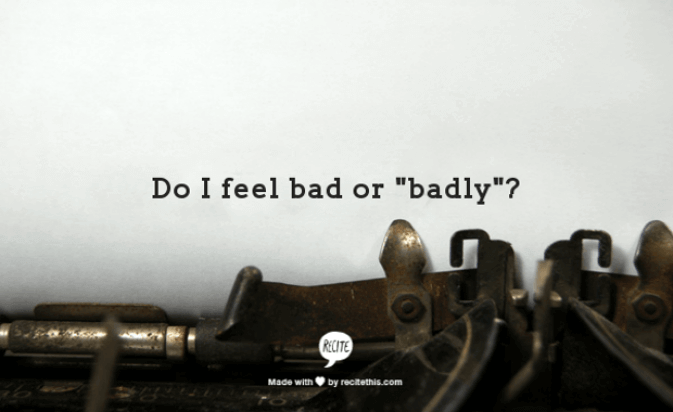If You Feel Badly, You Might be a Robot
As a mother, I try my best to keep my 2-year-old daughter engaged in activities that are educationally stimulating and don’t involve her sitting in front of a television. But as an exhausted mother, I realize that my mommier-than-thou attitude only goes so far before I need a break (to use the potty or make lunch) and that’s when a flexible approach to TV time comes in handy. At these times I take care to let my daughter watch educational shows that promote, among other things, literacy. Apparently they don’t feel as strongly as I do about grammar though. 
Just the other day, while making chicken quesadillas (her current favorite), I heard a character on the show Super Why! say, “I feel so badly.” I let out a “Ha!” and then finished up with the food.
Bad vs. Badly
Wanting to share a laugh over this, I posted it on Facebook. The only people who knew why “I feel so badly” is incorrect were English teachers (in an unrelated note, this was the moment when I realized I might be a bit nerdy). Apparently, it’s a common mistake. In an episode of Celebrity Apprentice, Donald Trump incorrected (correcting someone with incorrect information—fun word right?) Cyndi Lauper, insisting she meant she felt “badly”. Oh, Donald, stick to real estate.
Verbs
To understand the problem, let’s first take a look at the nature of the verb “feel”. Usually, most verbs fall into one of three categories: action verbs, linking verbs, and auxiliary (a.k.a. helping) verbs.
· Action verbs do what their name implies; they express action by describing the behavior of a person, place, or thing. “The woman removes her make-up.”
· Linking verbs generally express emotions or states of being. “He is a crazy person.”
· Auxiliary verbs help other verbs and appear in front of linking or action verbs. “We are going to the movies.” In this case “are” is acting as an auxiliary verb helping the action verb “going”.
The reason most people are confused about whether they feel bad or badly is because the word “feel”—like a few of the verbs that express the body’s senses—falls into both the linking verb category and the action verb category. The problem arises when it comes to describing the verb; action verbs are describes using adverbs, and linking verbs use adjectives. So it all boils down to context.

Adjective vs. adverb
Technically, the sentence “I feel so badly” isn’t incorrect, as long as it’s in the right context. “Badly” is an adverb, so to fulfill its adverb destiny it must be used to describe an action verb. Imagine you are back in grade school and you have covered your fingers in glue and let it dry (this may sound strange to some, but I used to see lots of kids doing this). Your friend says to you, “Feel my sweater, it’s so soft.” You try it, but you can’t feel a thing because of your gluey hands. You reply, “I feel badly.” It sounds a bit clunky, but technically it’s the correct usage. You’re describing your ability to feel.
In the sentence “I feel so bad,” the word “bad” acts as an adjective describing your emotional state of being. As in, “I can’t believe he waited for me that whole time; I feel so bad.” So when the cartoon character lamented his decision to make a mess in his brother’s bedroom and said “I feel so badly,” he was describing the action having an emotion, and not the emotion itself. A robot feels badly. A sociopath feels badly. A boy who gets yelled at after making a mess feels bad. I’m pretty sure the cartoon character in question isn’t a sociopath or a robot, but I could be wrong…
Now that you know when to use “bad” and when to use “badly”, go out into the world and correct all those people claiming to have malfunctioning emotions. Then come back here and tell me all about it, I’d feel bad if you didn’t.
